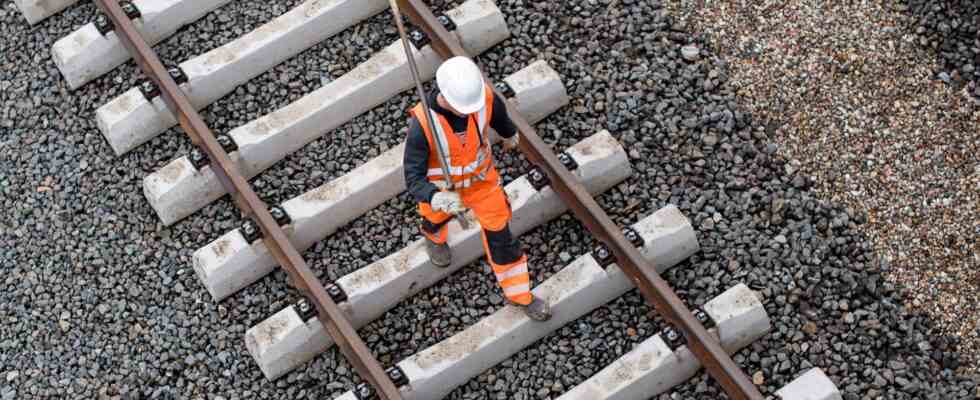Status: 07/16/2022 09:49 am
The rail network of Deutsche Bahn is apparently worse than known. And with the increased number of passengers with the 9-euro ticket, the deficiencies in rail transport are even more clearly in focus.
Train delays or cancellations and a partly dilapidated rail network: Deutsche Bahn is repeatedly exposed to these criticisms. But right now – due to the increased travel volume in the summertime and also due to the 9-euro ticket – the weak points of the state-owned company are becoming particularly clear, emphasize unions. And according to a media report, there are more of these vulnerabilities than previously known.
The group itself speaks of so-called slow-moving sections for the sections of track on which rail traffic is particularly hesitant. At the beginning of last month there were 331 of them nationwide, as can be seen from the evaluation of the “Spiegel” of internal route data for train drivers from June 3rd.
Accordingly, there were defects such as defective signals, damaged bridges or damage to the track on 60 of the affected rail sections. Construction sites delayed operations on 123 sections. According to “Spiegel”, 225 of these slow-moving sections have existed for more than a month, some even for more than five years.
Bund does not know about all “slow sections”
And apparently the federal government is far from aware of all these problem routes. In response to a request from the Greens in the Bundestag, the Federal Ministry of Transport announced that Deutsche Bahn had indicated 189 such slow-moving sections for April. Last year there were a total of 476 – almost as many as in 2016 with 485 sections on which there were delays.
Deutsche Bahn itself justified the discrepancy between the figures reported to the federal government and those listed in the “Spiegel” analysis by saying that the federal government was only informed of the slow-moving sections due to defects, where the modernization and maintenance of the infrastructure was necessary.
More investments planned in the coming years
Federal Transport Minister Volker Wissing is also aware that the state of the rail network is not the best. At a joint press conference with Bahn boss Richard Lutz about three and a half weeks ago, the FDP politician himself admitted that the infrastructure had been “neglected for years and brought to its absolute limit by underfunding and political failures”.
That is why the federal government also wants to invest more – the nationwide rail network is to be completely renovated between 2024 and 2030. For the current year, the federal government has already announced investments of around 1.9 billion euros for rail expansion and new construction. This sum is to be increased to three billion euros per year by 2027.
According to figures from the “Allianz pro Schiene” lobby group, the federal government increased spending on the rail network last year. The federal government invested an average of 124 euros in the rail infrastructure per German citizen – and according to the association, more than ever before. For comparison: in 2020 the per capita expenditure of the federal government for rail was still 88 euros. According to Allianz pro Bahn, in 2021 for the first time more money went into the maintenance and expansion of the rail network instead of the road network.
“I’ve never experienced anything like this before”
The train drivers’ union GDL also criticized that the state of Deutsche Bahn was “catastrophic due to years of broken savings”. GDL boss Claus Weselsky sees this as a reason for the “chaos this summer” that he had never experienced before. The chairman spoke of an “absolute super meltdown”.
Because especially since the beginning of June, the deficiencies at Deutsche Bahn have become all the more apparent in view of the increased number of passengers thanks to the 9-euro ticket, according to the railway and transport union (EVG). “I have never experienced such conditions as this summer,” said its deputy chairman, Martin Burkert, in an interview with “Welt am Sonntag”. Signs of wear and tear were noticeable on the railway: “Elevators are defective, toilets on trains no longer work, everything is simply under a lot of strain.”
And the staff at Deutsche Bahn feel it too. “Many colleagues are already at their breaking point,” warned Burkert. Sickness rates are already high and will continue to increase.
Dampener for punctuality
The effects of the 9-euro ticket and construction sites are also reflected in the statistics on train punctuality. In June, only 58 percent of all long-distance trains were still on schedule, compared to 88.5 percent in regional traffic. Both are the weakest monthly values since the end of 2010.
According to railway statistics, all trains that are delayed by no more than six minutes are considered punctual.

